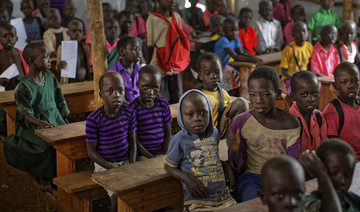BEIRUT: At least 10 people were killed in Lebanon on Thursday in Israeli drone attacks on roads across the south, Mount Lebanon and Bekaa.
Former Hezbollah chief Hassan Nasrallah’s uncle and his family members were also killed by strikes in southern Lebanon.
In Baalbek-Hermel, dozens of victims were laid to rest. They died trapped under the rubble of several flattened buildings, some adjacent to the Baalbek Temple.
In the afternoon, an Israeli strike targeted Tyre.
An Israeli drone hit a car on the Araya road in Mount Lebanon, killing the driver, a 30-year-old woman, making her Israel’s first female target.
Doaa Mattar’s family said that they lost contact with their daughter at the time of the raid.
A relative said that Mattar had taken her friend’s car to drive her family from Beirut to Bhamdoun.
Her body was taken to Hezbollah’s Al-Rassoul Al-Azam Hospital, while two injured passersby — a man and his grandson — were transported to the Sacre Coeur Hospital.
Hours later, another Israeli drone targeted a car on the Awali River road at the entrance to the city of Sidon, south of Beirut.
The strike killed three people inside the vehicle, injured three Lebanese soldiers at a nearby checkpoint and damaged several cars, including a passing UNIFIL convoy bus.
It resulted in five minor injuries among Malaysian UNIFIL soldiers and two civilian injuries.
Meanwhile, Beirut’s southern suburb experienced a violent night of airstrikes that continued until the early hours of Thursday morning, targeting Haret Hreik, Burj Al-Barajneh, Tahwitat Al-Ghadir and Ouzai.
One of the strikes came close to a runway at Beirut airport, causing damage to facilities.
However, airport operations continued, with Middle East Airlines switching to alternative runways for landing minutes after Israel issued evacuation warnings.
All planes heading for Beirut landed shortly before midnight ahead of the Israeli-imposed deadline.
The airstrikes on the southern suburb of Beirut caused extensive damage to residential buildings, shops, schools, social facilities and health centers.
A week of relative calm in Beirut’s southern suburb was shattered as warning sirens caused recently returned residents to flee north.
Many families were forced on to the streets, waiting in their vehicles at a safe distance from the targeted areas.
The Israeli military claimed to have conducted precision strikes against Hezbollah command centers and military infrastructure in the Lebanese capital, according to military spokesman Avichay Adraee.
Israel’s systematic destruction of southern Lebanese towns continued with renewed intensity. Israeli forces reportedly rigged and detonated entire neighborhoods in the border town of Mays Al-Jabal.
Israeli warplanes conducted strikes on the outskirts of Yahmar Al-Shaqif near the Litani River, hitting the town center and eastern areas. The predominantly Christian town of Rmeish, whose residents have steadfastly refused to leave, was also targeted.
In Jbaa, located in the Tuffah region, airstrikes caused significant damage. A separate strike on Bazouriye killed four members of Nasrallah’s extended family, including his uncle, cousins and their grandson.
Reports indicate that Israeli forces used internationally prohibited cluster bombs in their targeting of agricultural fields.
The scope of destruction has reached unprecedented levels in Nabatieh, where medical facilities, businesses, institutions, warehouses and residential buildings have been severely damaged.
Footage shared on social media revealed that entire neighborhoods had been turned into rubble.
Violent clashes erupted on Wednesday evening between Hezbollah fighters and Israeli forces near Rmeish and Yaroun, opposite the Dovev settlement.
Exchanges of fire were also reported near Aita Al-Shaab when Israeli forces attempted to advance into Lebanese territory.
The death and injury toll continues to mount, with the Bekaa region alone reporting 60 casualties, with dozens wounded.
Scenes of mass burials echoed those from Gaza. Among the dead are multiple generations of families, including the Abu Asbar family, who lost parents, children, grandchildren and in-laws during a single Israeli strike.
The attacks have also threatened Lebanon’s cultural heritage, with damage reported near the historic Baalbek Castle complex and the century-old Al-Manshieh building, known for its cultural artifacts.
The Palmyra Hotel, which has hosted decades of Baalbek festivals, also sustained damage.
Baalbek Mayor Mustafa Al-Shall said: “The enemy is targeting poor and residential neighborhoods, and it did not spare archaeological, heritage and historical sites. The number of martyrs in Baalbek is very high.”
One Israeli strike targeted soldier Raed Dandash, born in 2003, as he was driving his car in the town of Talia, in the Bekaa.
An official statement said: “Along with Raed, the strike killed his sister Nathalie and his brother Mohammed, while their mother was seriously injured.”
Airstrikes hit new areas in northern Bekaa, including the towns of Fakeha and Harfouch, killing one.
Lebanon’s officials were shocked by the attacks that targeted the vicinity of Baalbek Castle.
Culture Minister Mohammed Wissam Mortada sent an urgent appeal to UNESCO chief Audrey Azoulay through the head of Lebanon’s permanent mission to the organization, Mustafa Deeb, to “save the castle.”
Several MPs also sent a letter to Azoulay, calling on the international organization to “protect the common heritage of humanity.”
In the letter, MP Najat Saliba called for “the protection of historical sites in Lebanon, especially Baalbek, Tyre, Sidon and other valuable landmarks that are in grave danger due to the escalation of atrocities.”
She said: “These landmarks are priceless not only for our nation but for humanity. They are facing a growing danger with the escalation of the war. Their protection is a responsibility that needs to be assumed in order to preserve a part of human civilization that belongs to our common global and international heritage.”
One building destroyed by Israeli strikes bore an etching showing the year 1928. It was once frequented by French officers during France’s rule over the country.
The Israeli army announced that one of its soldiers “was killed in battles in southern Lebanon, while 60 Hezbollah members were killed during the past 24 hours.”
Hezbollah issued a statement calling on settlers in northern Israel to leave their settlements, warning that they had become become military targets.





























